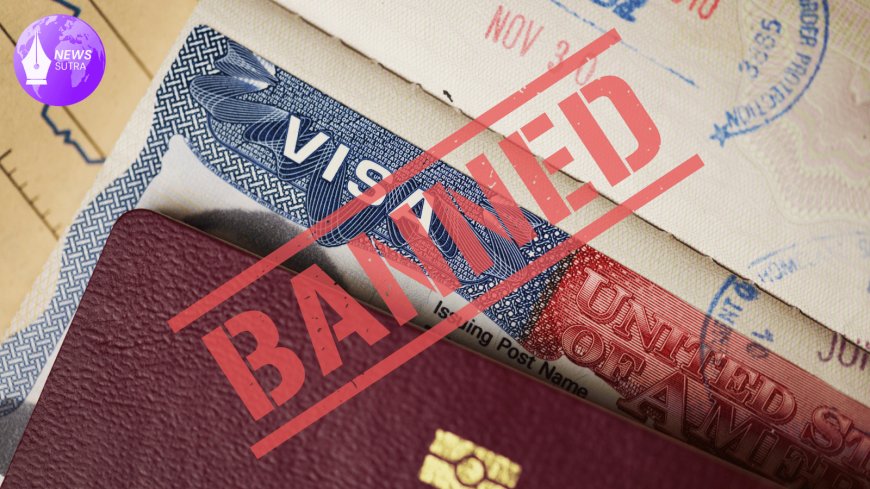US Visa Suspension for Palestinian Passport Holders Disrupts Medical Care, Education, Family Reunions
The U.S. has halted visas for Palestinian passport holders under Trump’s immigration crackdown, disrupting medical care, education, and family reunions while revoking visas for Palestinian leaders ahead of the UN General Assembly.

In a sweeping move, the United States has expanded visa restrictions to include nearly all individuals holding Palestinian passports—disrupting access to medical treatments, education, business, and essential family reunions. This policy, part of President Trump's broader immigration crackdown, also revokes visas for Palestinian officials and coincides with continued deportations to Rwanda, raising concerns about public health, diplomatic norms, and human rights.
Scope of the Visa Suspension
According to a New York Times report, the U.S. has broadened its visa limitations—previously focused on visitors from Gaza—to apply to nearly all Palestinian passport holders, blocking access for nonimmigrant visa categories like medical, educational, business, and family visits ReutersThe Guardian.
Earlier, visitor visas for Gaza were paused while the State Department conducted “a full and thorough” review The GuardianVanity Fair. This suspension now extends well beyond Gaza to include Palestinians living in the West Bank and in diaspora communities TRT WorldAL-Monitor.
Targeted Officials and UN Disruption
On top of the broader suspension, Secretary of State Marco Rubio has revoked the visas of Palestinian President Mahmoud Abbas and 80 other officials, blocking their attendance at the U.N. General Assembly and related peace talks AP News+1. This move has drawn sharp criticism from the Palestinian Authority, the U.N., and other global actors who argue it violates international law and the U.S.’s obligations as host nation to the U.N. AP News+1.
Human Impact: Stories Beyond the Headlines
The policy has profound consequences for affected individuals:
-
Medical Aid Cut Off
Injured children from Gaza who previously accessed life-saving treatments in the U.S. are now blocked, as advocacy groups warn of devastating humanitarian consequences. Over 3,800 medical visas had been issued in 2025 alone—some destined for Gazan patients—before the halt Vanity Fair. -
Academic and Professional Disruption
Students, educators, and professionals from Palestine are unable to travel to the U.S. for studies, conferences, or business, jeopardizing careers and academic progress. -
Family Separation
Routine family visits—including reunions, caregiving, and milestone celebrations—are frozen as visa applications stall indefinitely.
Legal Challenges and Ethical Concerns
-
Congressional Pushback
More than 140 House Democrats have called for exemptions for injured Gaza children and demanded a transparent timeline for visa reviews New York Post. -
Civil Society Outcry
Human rights and pro-Palestinian groups have condemned the policy as politically driven, discriminatory, and inhumane—especially given the policy’s abrupt nature and scope. -
Legislative Context
The proposed SAFE Act of 2023 (H.R. 6211), if enacted, would formally prohibit visa and refugee admission for Palestinians, aligned with the current executive trend of exclusion Wikipedia.
Public Health Angle: Immigration Policy Meets Zoonotic Risk
Although not widely publicized, one notable concern relates to public health—I.e., rising U.S. rabies cases tied to porous border controls and unchecked animal movements. By limiting legal entry avenues, some argue individuals may resort to irregular routes, increasing cross-border animal movement and potentially contributing to disease vectors. The visa suspension could inadvertently create unintended health risks, underscoring the need for integrated immigration and public health planning.
Conclusion
The Trump administration's sweeping visa suspension for Palestinian passport holders in 2025 crosses humanitarian, diplomatic, and legal boundaries—halting critical medical care, educational access, and family reunions while disrupting Palestinian representation at the U.N.
Tied to broader executive action, including deportations and border security crackdowns, this policy raises urgent questions: Where do national security measures end and human rights begin? How can the U.S. uphold its international obligations without compromising safety? And how do we ensure health risks—including those from unintended migration paths—are not ignored?
As the debate intensifies, storytelling, data, and empathy remain essential to inform and shape public policy response.
What's Your Reaction?
 Like
0
Like
0
 Dislike
0
Dislike
0
 Love
0
Love
0
 Funny
0
Funny
0
 Angry
0
Angry
0
 Sad
0
Sad
0
 Wow
0
Wow
0








































































